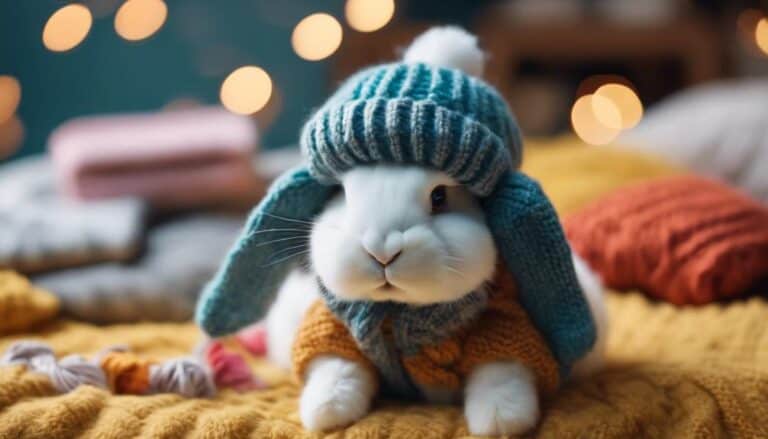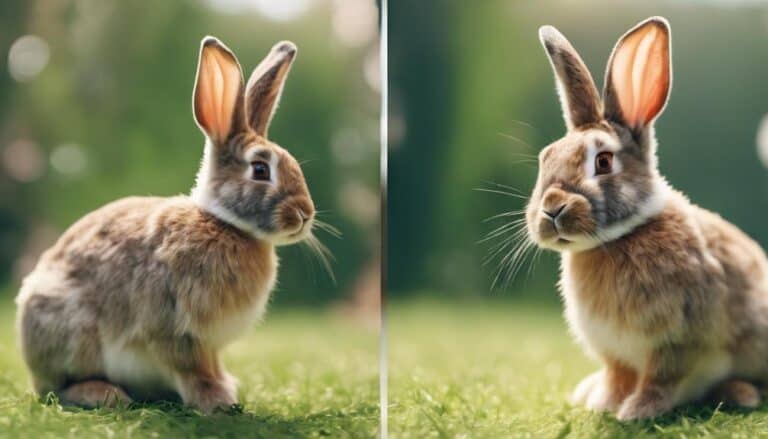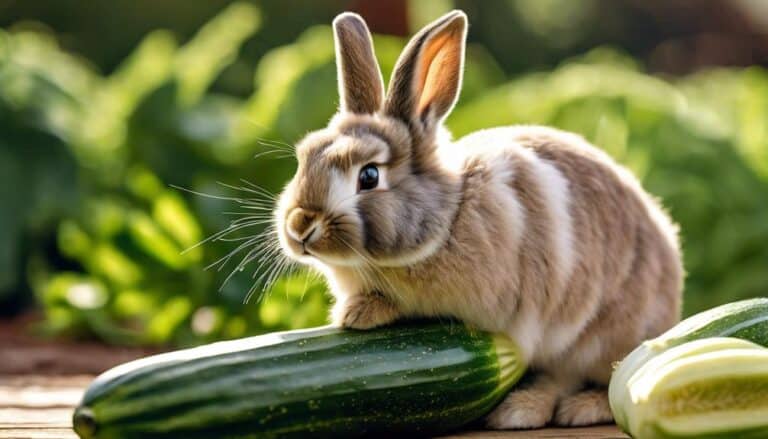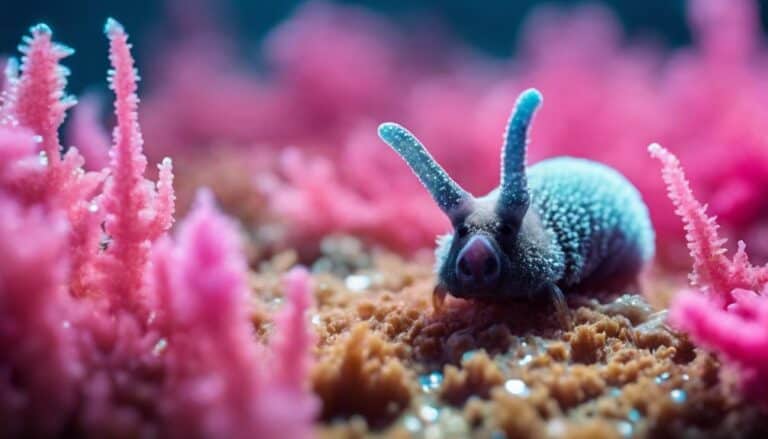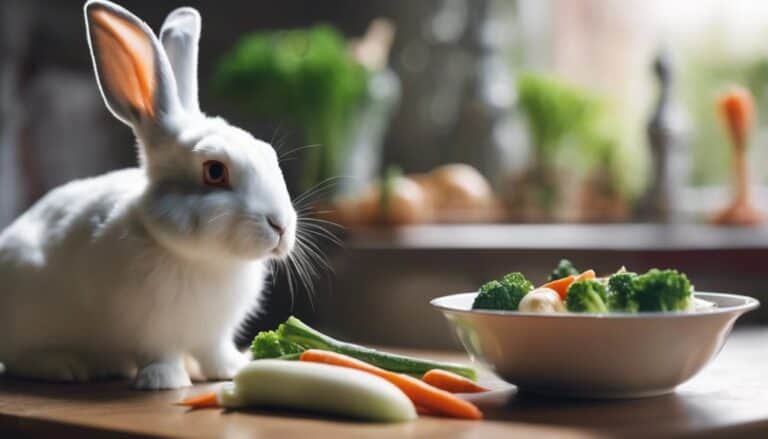Have you ever wondered if bunnies possess the ability to imprint like other animals?
The concept of imprinting in rabbits is a fascinating and vital aspect of their development, influencing their behavior and relationships.
Understanding how bunnies imprint can offer insights into their social interactions and the dynamics of human-rabbit bonds, shedding light on the intricate nature of these adorable creatures.
Contents
- 1 Key Takeaways
- 2 Imprinting Behavior in Baby Bunnies
- 3 Signs of Bonding in Rabbits
- 4 Factors Affecting Bunny Imprinting
- 5 Human-Rabbit Relationship Dynamics
- 6 Can Wild Bunnies Imprint on Humans?
- 7 Impact of Early Socialization on Bunnies
- 8 Understanding Rabbit Attachment Patterns
- 9 Nurturing a Strong Bond With Your Bunny
- 10 Frequently Asked Questions
- 11 Is It Safe for Bunnies to Imprint on Humans if They Watch TV?
- 12 Conclusion
Key Takeaways
- Imprinting behavior is crucial for baby bunnies' development and bonding.
- Early experiences and caregiver attachment significantly influence bunny imprinting.
- Proper socialization and nurturing interactions shape healthy imprinting patterns.
- Quality care during critical developmental stages fosters strong bonds and positive behaviors.
Imprinting Behavior in Baby Bunnies
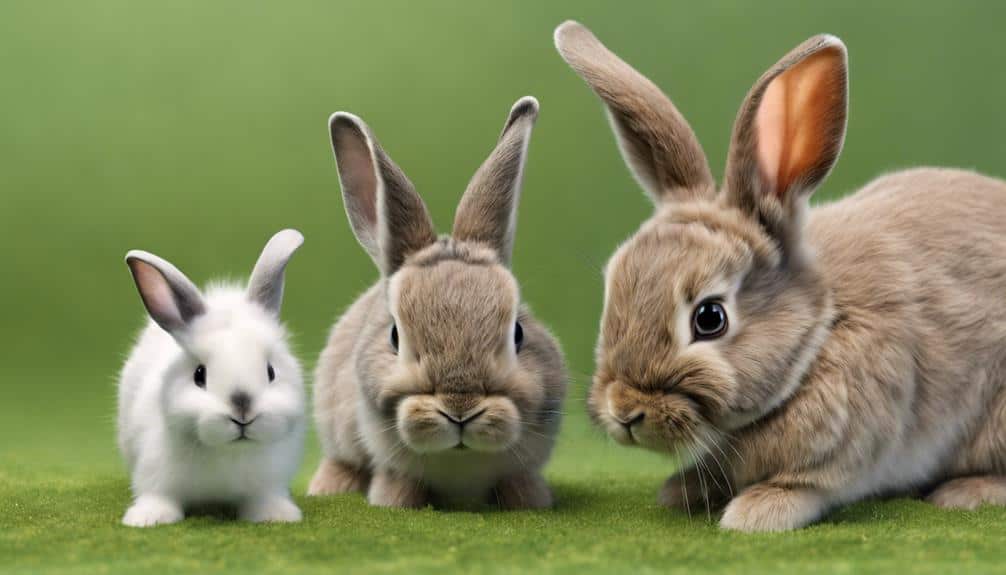
When caring for baby bunnies, understanding the significance of imprinting behavior is important to their well-being and development. Pet rabbits rely on this early bonding process to form strong attachments with their caregivers. Make sure to interact with your baby bunnies consistently and gently, as they're highly receptive during this critical period. Every time you feed, handle, or interact with them, you're contributing to their imprinting experience.
Proper imprinting lays the foundation for a healthy relationship between you and your pet rabbits. It helps them feel secure and comfortable in their environment, leading to a well-adjusted and social bunny. Incorrect imprinting, such as rough handling or limited social interaction, can result in behavioral issues down the line. Understanding and prioritizing this natural bonding process will set the stage for a happy and fulfilling companionship with your pet rabbits. Remember, every moment counts when it comes to imprinting behavior in baby bunnies.
Signs of Bonding in Rabbits
Observing the behaviors of your pet rabbit can provide valuable insight into the strength of your bond with them. Here are some signs that indicate your first bunny is bonding with you:
- Grooming: Your rabbit grooming you, whether through licking your hand or nibbling gently, signifies trust and affection, showing that they feel comfortable and safe with you.
- Circles Your Feet: Running in circles around your feet, especially during greetings or meal times, is a sign of happiness and excitement towards your presence, reflecting a strong bond.
- Seeking Petting: Constantly seeking petting and showing affection through nudging or lowering their head for pets demonstrates love and trust, reinforcing the bond between you and your bunny.
- Laying Next to You: When your rabbit chooses to lay next to you, it signifies a deep level of trust and comfort, indicating a strong bond and a sense of security in your presence.
Factors Affecting Bunny Imprinting

When considering factors affecting bunny imprinting, understanding the behavior patterns associated with imprinting, early social interactions, and the importance of caregiver attachment in fostering strong bonds is crucial.
Early experiences and the quality of care provided can greatly influence how bunnies form attachments, highlighting the importance of nurturing interactions during critical developmental stages.
Environmental stimuli, social interactions with other animals, and the timing of exposure to caregivers all play an important role in shaping imprinting patterns in bunnies.
Imprinting Behavior Patterns
How do various factors influence bunny imprinting behavior patterns, and what role does proper socialization play in this process? Bunny imprinting involves forming a strong attachment during a critical period. Here are four key points to bear in mind:
- Imprinting techniques and early experiences greatly impact behavioral development.
- Imprint bonding with caregivers strongly influences bunny imprinting behaviors.
- The critical period for imprinting underscores the importance of proper socialization for long-term socialization benefits.
- Care quality, positive interactions, and handling practices are vital for fostering healthy bunny imprinting patterns.
Understanding and facilitating proper bunny imprinting can lead to well-adjusted and socialized rabbits, enhancing their behavior, trust, and relationships with humans and other animals.
Early Social Interactions
Early social interactions greatly shape bunny imprinting behaviors, impacting their development and forming important attachments during key developmental stages. Socialization techniques and bonding methods, along with positive caregiver interactions, are vital in the early experiences of bunnies.
Providing gentle handling, consistent care, and creating positive associations are essential factors for successful bunny imprinting. Behavioral development in bunnies is greatly influenced by these early interactions, affecting their imprinting effects. Negative experiences or a lack of socialization during this critical period can lead to behavioral issues in bunnies.
Hence, it's important to pay close attention to the quality of social interactions and environmental stimuli during the early stages of a bunny's life to guarantee healthy imprinting and proper behavioral development.
Caregiver Attachment Importance
Establishing a strong imprinting bond with bunnies hinges on the caregiver's quality of care, consistency, and emotional connection with the furry companions. When it comes to caregiver attachment development and its influence on bunny imprinting, here are some key points to take into account:
- Emotional bonding and consistency in care are essential for fostering a deep connection with bunnies.
- The quality of care, including proper handling, feeding, and socialization, plays a significant role in imprinting.
- Imprinting impact on bunnies is heavily influenced by the caregiver's connection, early experiences, and interaction style.
- Bunny imprinting can lead to long-lasting attachments, trust, and a sense of security with their caregiver, highlighting the importance of nurturing these relationships.
Human-Rabbit Relationship Dynamics
Understanding the dynamics of the relationship between humans and rabbits is crucial for fostering a strong bond and trust in bunnies. Trust building is fundamental in nurturing a positive connection with your rabbit. Consistent gentle handling, providing appropriate care, and understanding their needs are key elements that contribute to building trust and forming a strong emotional connection.
Communication cues are essential in the human-rabbit relationship. Pay attention to your rabbit's body language, vocalizations, and behaviors to better understand their feelings and needs. Responding appropriately to these cues can strengthen the bond between you and your bunny.
Developing an emotional connection with your rabbit involves empathy, patience, and respect for their individuality. By investing time and effort in understanding your rabbit's behavior and preferences, you can create a harmonious and affectionate relationship where your bunny feels safe, loved, and secure.
Can Wild Bunnies Imprint on Humans?
Wild bunnies, in their natural state, don't typically imprint on humans due to their wild instincts and behaviors. Imprinting is more common in animals raised by humans from a young age, leading to strong bonds and social interactions.
Understanding the differences between wild and domesticated bunnies can give insight into their imprinting behavior.
Wild Bunnies and Humans
Wild bunnies typically don't imprint on humans due to their inherent fear and preference for maintaining distance. When considering human interaction with wild bunnies, it's crucial to understand the fear response these animals exhibit, focusing on survival instincts rather than imprinting.
Social behavior in wild bunnies emphasizes maintaining distance from humans to avoid negative consequences. Attempting to interact closely with wild bunnies can lead to stress and potential harm, as they're naturally inclined to flee from perceived threats.
To guarantee the well-being of wild bunnies and yourself, it's best to appreciate them from afar and respect their need for space and autonomy in their natural habitat.
Imprinting Behavior Explanation
Imprinting behavior in bunnies, particularly wild ones, is influenced by their natural instincts and survival strategies, impacting their interactions with humans. While wild bunnies are less likely to imprint on humans due to their innate behaviors focused on survival and predator avoidance, domesticated rabbits can develop strong bonds with humans through early exposure and socialization. Imprinting development and behavioral cues vary between species, with precocial animals like birds more prone to imprinting compared to altricial species such as rabbits. In the long term, domestic rabbits may exhibit attachment behaviors akin to imprinting, showing trust and affection towards their human caregivers. Despite the differences, positive interactions and consistent care can help wild bunnies form lasting relationships with humans.
| Imprinting Development | Imprinting in Different Species | Imprinting Effects |
|---|---|---|
| Influenced by instincts and survival strategies | Varies between precocial and altricial species | Leads to strong bonds and attachment |
Impact of Early Socialization on Bunnies
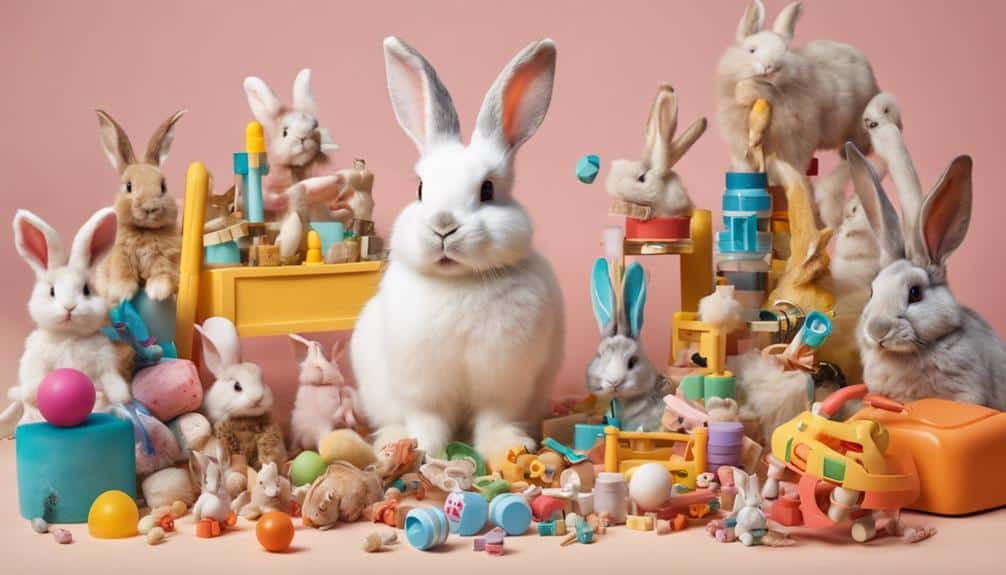
Early socialization plays an important role in shaping the behavior and bond between bunnies and humans. When bunnies are properly socialized from a young age, several essential benefits and outcomes are observed:
- Socialization benefits, bonding outcomes: Proper socialization helps bunnies feel more at ease and secure in their surroundings, leading to stronger bonds with their human caregivers.
- Trust building, behavior development: Early socialization aids in building trust between bunnies and humans, fostering positive behaviors and preventing fearfulness or aggression.
- Interaction impact, relationship building: Well-socialized bunnies tend to be more friendly, confident, and adaptable, making it easier to interact with them and build a harmonious relationship.
- Early intervention importance: Starting socialization at a young age is critical as it ensures bunnies grow up with good social skills, making them easier to handle and care for as they mature.
Understanding Rabbit Attachment Patterns
How do rabbits develop attachment patterns with their human caregivers?
Rabbits form attachment patterns based on trust building, comfort seeking, and caregiver bonding. Unlike animals that imprint, rabbits establish connections through positive interactions and care. To nurture a strong bond with your bunny, focus on understanding their communication cues and respecting their natural behaviors.
Vital bonding is essential for rabbits, who seek comfort and security in their human companions. Positive interactions, such as gentle handling and meeting their needs consistently, play a significant role in building a bond with your rabbit. By creating a safe and nurturing environment, you can strengthen the attachment between you and your furry friend.
Rabbits communicate through various cues, such as body language and vocalizations. Understanding these signals and responding appropriately can enhance the bond between you and your bunny. Paying attention to your rabbit's preferences and providing a sense of security will help establish a deep and lasting connection based on trust and mutual respect.
Nurturing a Strong Bond With Your Bunny
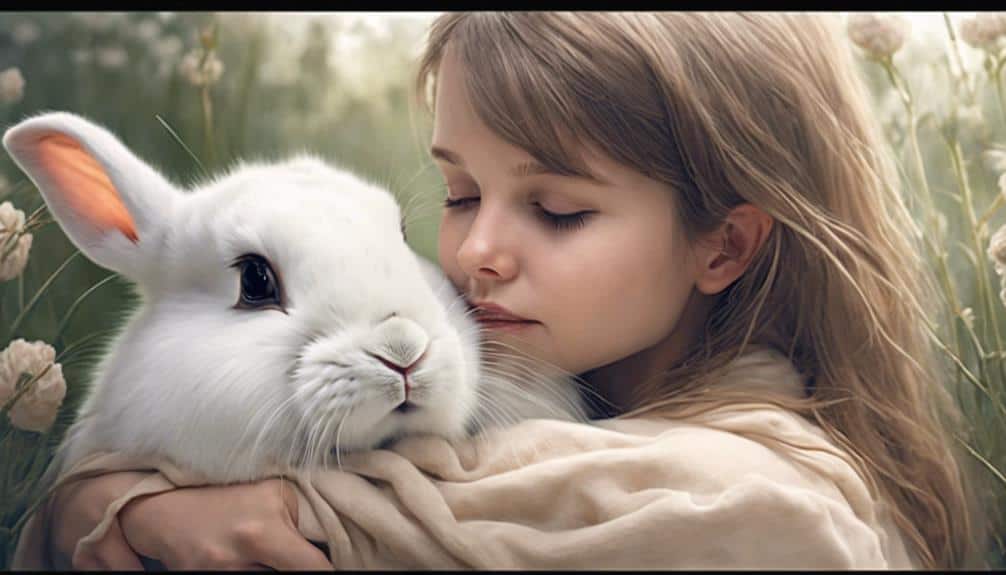
To foster a strong bond with your bunny, prioritize consistent, gentle interaction and positive reinforcement to establish a foundation of trust and affection. Building trust, positive reinforcement, and creating a connection with your bunny are vital steps in nurturing a strong and lasting bond. Here are four essential tips to help you build a meaningful relationship with your fluffy companion:
- Consistent Interaction: Spend quality time with your bunny every day, engaging in activities like petting, grooming, and playing to strengthen your bond.
- Positive Reinforcement: Use treats, praise, and gentle handling to encourage good behavior and create a positive association with you as their caregiver.
- Respect Their Space: Allow your bunny to approach you on their terms, respecting their boundaries and providing a safe environment where they feel secure.
- Communication: Pay attention to your bunny's body language and vocal cues, responding to their needs and preferences to foster mutual understanding and trust.
Frequently Asked Questions
What Does It Mean When a Rabbit Imprints?
When a rabbit imprints, it forms a deep bond with a caregiver or object. Signs of attachment include seeking closeness, following, and vocalization. This imprinting process is vital for rabbit behavior and social development, shaping their psychology.
How Long Do Rabbits Imprint on Humans?
During the imprinting phase, rabbits bond with humans through social interaction, building trust and attachment. This period can last from days to weeks, shaping their behavior. Consistent care and positive experiences foster a strong human-rabbit bond.
Can Rabbits Get Attached to Their Owners?
Rabbits can definitely get attached to their owners. Through bonding behaviors like grooming and nudging, social interactions, and emotional connections, these furry friends show signs of trust and affection, strengthening their attachment.
Do Rabbits Have a Favorite Human?
In bonding behaviors, rabbits often display preferences for humans who provide care and positive interactions. Rabbit body language, like seeking affection or treats, indicates their favorite human. Social interactions, trust, and consistency foster these connections.
Is It Safe for Bunnies to Imprint on Humans if They Watch TV?
Yes, bunnies watching TV capabilities are indeed a thing. However, it’s not entirely safe for bunnies to imprint on humans if they watch TV. Excessive screen time can disrupt their natural behaviors and routines. It’s best to limit their exposure and provide plenty of enrichment activities instead.
Conclusion
As you continue to nurture your bond with your bunny, remember that imprinting plays an important role in their behavior and attachment towards you. By understanding the signs of bonding and providing a loving environment, you can strengthen the connection with your furry friend.
Just like a classic love story, your bunny's imprinting journey will leave a lasting mark on both of your hearts. Keep nurturing that special bond and watch it grow stronger every day.

